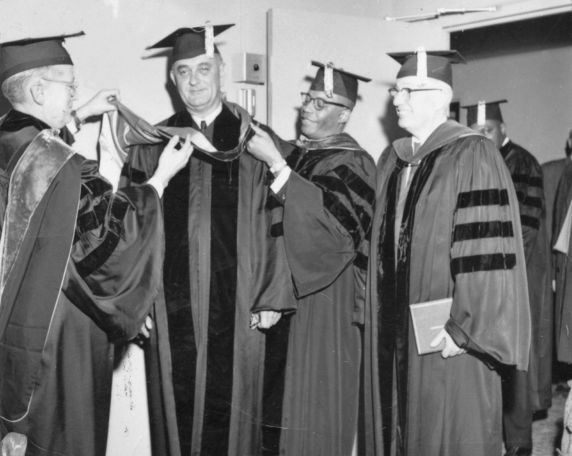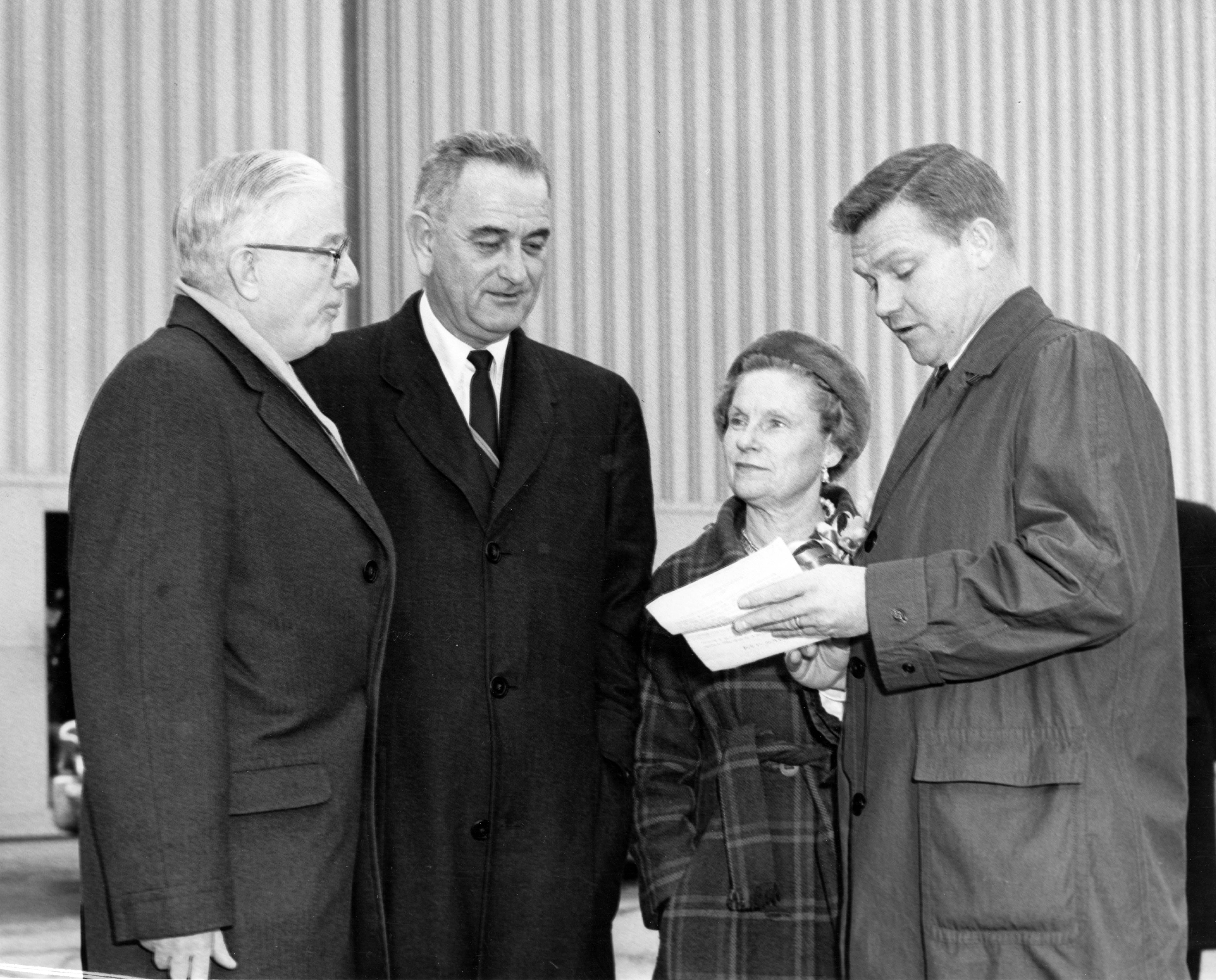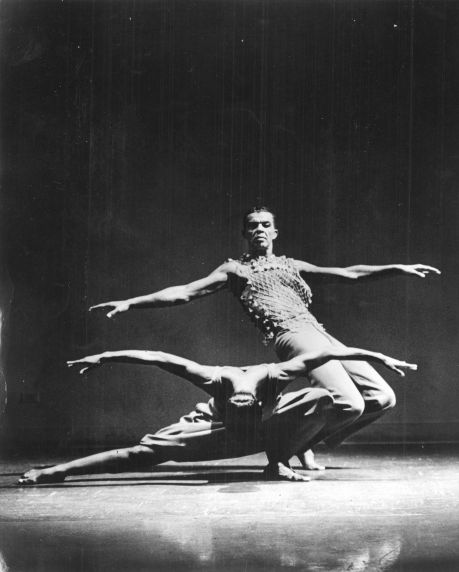The Emancipation Proclamation Centennial—1863-1963-2023
Note: This text includes language that is outdated and may be offensive. Titles of events and writings are included in their original language circa 1963.
A little-known collection in the Wayne State University Archives documents an event that took place at the university in 1963, 60 years ago this year, but commemorating a historic event 100 years before that. The year-long observance — the centennial of the 1863 Emancipation Proclamation — was marked by celebrations, lectures, symposia, performances, and the granting of honorary degrees. The small collection of the Wayne State University Emancipation Centennial Committee, which resides at the Walter P. Reuther Library, contains a wealth of correspondence, texts of speeches, and academic papers.
An original steering committee of 12 WSU individuals from various departments and offices, including President Clarence Hilberry, began meeting in 1962. They consulted with officials from Washington, DC, scholars from around the world, and notable civil rights leaders, performers, journalists, politicians, and activists. We learn from their memos and correspondence that, with support from the McGregor Fund, they planned a scholarly observance of the centennial year, to "focus attention on the significant contributions of the American Negro to the culture of the United States."
Demonstrating the national and international importance of this celebration, Arnold M. Rose, professor of sociology at the University of Minnesota, and John Hope Franklin, professor and chair of the department of history at Brooklyn College, served as co-chairs. Gunnar Myrdal, world-renowned sociologist and economist from the University of Stockholm, served as honorary chair. One notable organizer of this event was local activist and union organizer Mildred "Millie" Jeffrey, then Director of Community Relations for the UAW-CIO.
Over 14 months, noteworthy events took place on the WSU campus and other venues in Detroit, beginning with an inaugural event in September 1962 with President Hilberry and Michigan Governor John Swainson, and continuing with the opening convocation on January 6, 1963, when US Vice-President Lyndon Baines Johnson and Michigan Senator Philip Hart received honorary degrees. Johnson’s opening remarks are part of this collection. In February, a symposium entitled "Strategies of Stimulating Change" included leading civil rights leaders, and another in May, entitled "The Negro in a Changing Society," featured Professor Myrdal and other noted academics, along with many Detroit-area business and union leaders. A Moot Court presentation with U.S. Attorney General Nicholas Katzenbach and federal judges Theodore Levin and Wade McCree was hosted by WSU Law School Dean Arthur Neef.
The celebratory year ended in November with a symposium, "The Negro and Religion in America," and a second symposium, "The Negro and the Changing Arts," which was part of a week-long "Festival of Negro Art and Music."
It featured notable performers including the Alvin Ailey Dance Company and conductor-composer William Grant Still with the Detroit Symphony Orchestra. Proceeds from those performances benefited the United Negro College Fund and the African Art Gallery of the Detroit Institute of Arts.
Unfortunately, the tragic assassination of President John F. Kennedy occurred during that November week, just before the final festival performances. Compelling correspondence exists in the collection as organizers had to make decisions on how to proceed. A final concert was held that weekend of November 24th dedicated to the memory of President Kennedy.
Included among the documents in this collection are academic articles, speeches, correspondence, and biographical materials of the year’s many participants. A few of them, not already mentioned above are: academics Professor Sterling Brown and Dr. John Hope Franklin; civil rights leaders — James Farmer, Whitney Young, Jr., and Roy Wilkins; poet and activist Langston Hughes; Supreme Court Justice Thurgood Marshall; and political leaders such as Representative John Dingell, Jr.
Of note is a paper by Dr. Broadus N. Butler, a Tuskegee Airman and Assistant Dean of WSU's College of Liberal Arts, entitled "The City of Detroit and the Emancipation Proclamations." He traces the history of Detroit and the Michigan Territory as it developed into a state in terms of the status of Blacks, the anti-slavery societies of the pre-Civil War era, and the Underground Railroad. He writes of the "City of Detroit [as] the Incubator of Emancipation before her recent role as the Automobile Capital of the World and the Arsenal of Democracy." He also notes the need for continuing progress in race relations in Detroit and Michigan.
Reports in this collection summing up the many events of the year estimate that over 8,500 people took part in some aspect of the celebration. The local and national press recognized the significance of the Centennial celebration; there were rebroadcasts of the talks and performances and, later, other events around the country inspired by WSU's lead. A portion of the centennial papers were collected in a volume published by the Wayne State University Press, edited by Arnold M. Rose: Assuring Freedom to the Free: A Century of Emancipation in the U.S.A. (1964). The title was chosen from a phrase written by President Abraham Lincoln. A later president, the man who became president in November 1963, writes in this book’s introduction: "It is our responsibility and our trust in … 1963, to strike the chains of bias and prejudice from minds and practices as Lincoln, a century ago, struck down slavery." Six decades later his words still have relevance.




 Reddit
Reddit Facebook
Facebook LinkedIn
LinkedIn